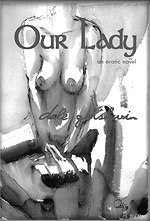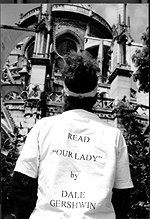Every couple of years some obscure, eccentric expat creeps out of some chambre de bonne somewhere in the capital — often the poorest digs in the poshest arrondissements — surfacing with a manuscript of Herculean dimensions that oozes with unreadable originality. This month one such work has emerged and, of even greater interest than this 400-page Paris-based fiction called “Our Lady,” is the phenomenon of authorship. Who are these people who uproot themselves from ordinary lives back home, digging into the Parisian cityscape with one obsessive and lonely passion: to write?
Of the 20 thousand manuscripts stuffed into my boîte aux lettres over the past 20 Septembers that I’ve spent working “in and around” publishing in this city, only a handful of these have been so distinguishedly fous and so accomplished in their total rejection of commonplace literary conventions as “Our Lady” does. Curious to know more about who penned these pages and why aspiring writers abandon comfort and opt for alienation and isolation in Paris, I tracked down Dale Gershwin. At first reluctant to agree to an interview ("I don’t give interviews, mostly because no one has ever asked for one, and frankly I don’t see why anyone would want to talk to me”), she gave in to my insistence. “Okay, but you have 20 minutes, and you’ll have to buy me a Vittel menthe.”
We met at a café on the eve of the publication of “Our Lady.”
Q: Who is Dale Gershwin, and how come no one has heard of you before?
DG: Next question.
Q: Okay, we’ll take another whack at it. A native of Saratoga Springs, New York, what brought you to Paris in the first place?
DG: Just look around you — whatever you see is what brought me to Paris. This is the most majestically beautiful city on Earth. Even in the less glamorous areas, — if you walk down the street with your eyes slightly raised toward windows or rooftops you’ll see majesty — or history — which amounts to the same thing. What Leslie, my protagonist, sees, lives, inhales during her run in Chapter Seven called “Kilometer Zero” — is what brought me to Paris. You see, the clichés are true.
Q: I read on the book jacket that you are a runner, and Leslie is constantly running through Paris, so the parallels run a lot deeper than chance. Talk about the relationship between the jogger and this city.
DG: Again I refer to my “Kilometer Zero” chapter — the run scene, the most experimental part of the book. Listen: “When she’s out even earlier, when the dawn is even darker and the streets are yet more still, and the Opera floats all the more hauntingly in its goldblue flood of light at the far elevated end of the wide approach, Leslie runs up the middle of its avenue. Up the middle. Like a zipper. Like a kite. Up the middle. Like she’d hidden in a dressing room when Paris closed for the night and no one knew she was there and she was left alone with the city behind locked doors and went to the base of the avenue de l’Opéra, near the Comédie Française, near the fountains, near the Palais Royal, and she shouldn’t be there — nobody should be there — but there she is, alone with the goldblue Opera blocks away before her in the morning, and declares her defiant homage by running up its gateway to its core.” That sensation is what happens — happens to a runner — at that hour in this city. Anywhere. Everywhere.
Q: Let’s get back to why you came to Paris. Many long-time residents decided to stay in Paris because of accidental affairs of the heart. Nothing like love to derail us from our life course. Was this true for you?
DG: Love is a manufactured emotion. Like coffee is an acquired taste. We love only once — truly love, only once. We use it all up the first time. The presence of the loved one slashes open our hearts and all the love in there pours out. Gushes out... spits out.
Whatever comes after that is just a synthetic substance made to fill the gap left by the first “real” thing.
Q: You really believe what you just said about love?
DG: It’s all in the book. The book is always more important than the author. The author is the vehicle, the container, but the book is what lives on, what has the ability to transport or mark readers. Let’s talk about the novel.
Q: “Our Lady” is cluttered with rather explicit scenes of varying intensity. The jacket identifies the work as erotic fiction. How do you distinguish between eroticism à la Henry Miller and plain old pornography?
DG: The only thing pornographic in the world is war. We don’t censor pictures of bombs falling on people’s houses, do we?
Q: How have you managed to remain wholly anonymous all these years?
DG: I know this sounds pompous, but I only was able to crawl out of my hole, a studio apartment on a tiny back street, when the book was not only written but I was ready to admit I’d written it. This is one of Paris’ greatest assets for creative people; it let’s you maintain your anonymity.




